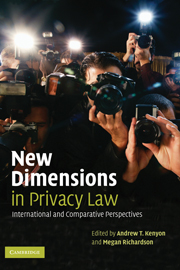Book contents
- Frontmatter
- Contents
- List of contributors
- Preface
- 1 New dimensions in privacy: Communications technologies, media practices and law
- 2 Privacy and freedom of speech
- 3 Revisiting the American action for public disclosure of private facts
- 4 The internet and private life in Europe: Risks and aspirations
- 5 APEC's privacy framework sets a new low standard for the Asia-Pacific
- 6 Copyright, privacy and digital rights management (DRM)
- 7 Why there will never be an English common law privacy tort
- 8 The ‘right’ of privacy in England and Strasbourg compared
- 9 Privacy and constitutions
- 10 Celebrity privacy and benefits of simple history
- Bibliography
- Index
- Index of laws and directives
- Index of case references
10 - Celebrity privacy and benefits of simple history
Published online by Cambridge University Press: 24 July 2009
- Frontmatter
- Contents
- List of contributors
- Preface
- 1 New dimensions in privacy: Communications technologies, media practices and law
- 2 Privacy and freedom of speech
- 3 Revisiting the American action for public disclosure of private facts
- 4 The internet and private life in Europe: Risks and aspirations
- 5 APEC's privacy framework sets a new low standard for the Asia-Pacific
- 6 Copyright, privacy and digital rights management (DRM)
- 7 Why there will never be an English common law privacy tort
- 8 The ‘right’ of privacy in England and Strasbourg compared
- 9 Privacy and constitutions
- 10 Celebrity privacy and benefits of simple history
- Bibliography
- Index
- Index of laws and directives
- Index of case references
Summary
Introduction
Is personal revelation the right of the subject alone or can others tell the story even without consent? The question lies at the heart of recent celebrity privacy cases. When Michael Douglas and Catherine Zeta-Jones claimed their wedding party had been intercepted by underground paparazzi with the photographs to be published in Hello!, their complaint was not that they should be let alone completely. Indeed they had contracted with OK! to give the public account of their celebration with carefully vetted authorised pictures. Yet they claimed their privacy was implicated and the equitable action for breach of confidence was the way to protect this; a claim partly and with some reservations accepted by the courts, which refused an interlocutory injunction but subsequently allowed damages for the unauthorised publication (at the time suggesting the injunction should have been awarded). When Naomi Campbell found herself the subject of an article in the Mirror revealing details of her treatment for a drug addiction, with covertly taken photographs in support, her essential complaint was that the story had been obtained and published without her knowledge or approval (although conceding that her own previous false accounts meant she was in no position to prevent telling about her addiction). Further, the House of Lords left her the option in finding her confidence breached.
- Type
- Chapter
- Information
- New Dimensions in Privacy LawInternational and Comparative Perspectives, pp. 250 - 269Publisher: Cambridge University PressPrint publication year: 2006
- 2
- Cited by



